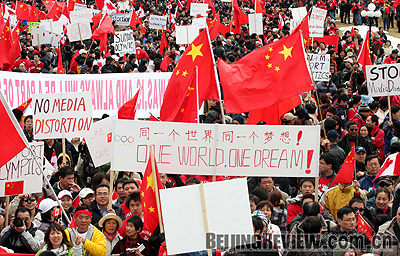|

SHOW OF UNITY: Overseas Chinese in Ottawa stage a protest against "Tibetan independence" and in support of the Beijing Olympics on April 13
For the global village, China's renewal is a source of economic growth, a factor of stability and an invitation to explore new ideas. In fact, through countless material or intellectual Silk Roads, an unprecedented intensity of exchanges between China and the world is already taking the global system to another level. Businesses, government's priorities and academic institutions have been transformed by this complex but promising process.
However, some fail to grasp the big picture, and for them, China's reemergence generates anxiety. This explains partly why nervousness is a recurring element of the Sino-Western relationship. In the midst of a phase of tension, one has to draw the attention to what really matters and to show the ways that are more conducive to a serene climate.
Recently, China and the overseas Chinese had to respond to various forms of attack. Those, mainly in the West, whose aim was to damage China's reputation and to disrupt the preparations of the Beijing Olympics, are now largely discredited and relatively marginalized. They wanted to weaken China, and they gave her an occasion to show her solidarity, resolve and sense of responsibility.
Unfortunately, they have created a situation where too much mistrust, resentment and confusion remain. This takes the energies away from what should be Washington, Brussels and Beijing's strategic goal: a cooperative and constructive Sino-Western relationship, keystone of the 21st century global order. Clarity, measure and purpose can help dissipate the clouds.
Negative comments on the Chinese world often reflect Western ignorance of a different context, its globally positive socioeconomic transformation, including in Tibet and in Xinjiang and, for some of its regions, its modernity. And, when a CNN commentator calls the Chinese "goons and thugs" and says that the products manufactured in China are "junk," or when the new mayor of London writes that "Chinese cultural influence is virtually nil, and unlikely to increase," ignorance becomes foolishness.
Counterproductive
But the Western "China-bashing" is also highly counterproductive. Anti-Chinese rhetoric or behaviors can only generate anti-Western attitudes within China. While Beijing and the West need to join their forces to solve the immediate environmental, political and economic problems threatening the global equilibrium, irresponsible activists and politicians are taking the risk to ignite new sterile antagonisms. There would be no winner in such a confrontational configuration.
Western officials also have to realize that by their harsh, accusatory and unfair criticisms, they reinforce China's most conservative forces. The Chinese reformers working for the deepening of Deng Xiaoping's reform and opening up need constructive and subtle international partners, not arrogant foreign demagogues manipulating issues for their own domestic and short-term political gains.
Moreover, and in the longer term, inaccurate reports or insulting remarks by Western commentators undermine the West's intellectual and moral credibility. It is the emulation between rich and nuanced analyses and not new forms of opposition between dogmatic statements that can enrich the debate.
Compromise
What can be done to overcome the current difficulties facing the Sino-Western relationship? Several elements have to be considered. Some are recommendations that can have almost immediate effects, and some are principles for the foundation of a cooperative future between China and the West.
Obviously, the Beijing Olympic Games is attracting the world's attention but one has to put this sporting event into context. Despite all the excitement and passion about the 2008 Games, one should keep in mind that it is a very small chapter of what is arguably the most significant story of our time, China's renaissance. By putting the games in perspective, all the parties can more easily stay within the limits of reason, the main parameter of a strong Sino-Western relationship.
One cannot expect China, the United States and the European Union (EU) to agree on everything, and one should be ready to accept differences and even tensions between the three. If properly managed, tensions do not have to lead to conflicts, but can result in adjustments and improvement.
Some in Washington and Brussels have not yet fully realized that China is a mature and sophisticated sovereign entity able to discern and defend its best interests. Excessive paternalism or a superiority complex can even lead to the assumption that one can dictate policy to China. During the 19th century and the first half of the 20th century, a declining Chinese world yielded to foreign imperial ambitions. The leadership of the post-1949 China will not replay this episode of humiliation. In the 21st century, Brussels and Washington can give advice or make suggestions on issues
| 